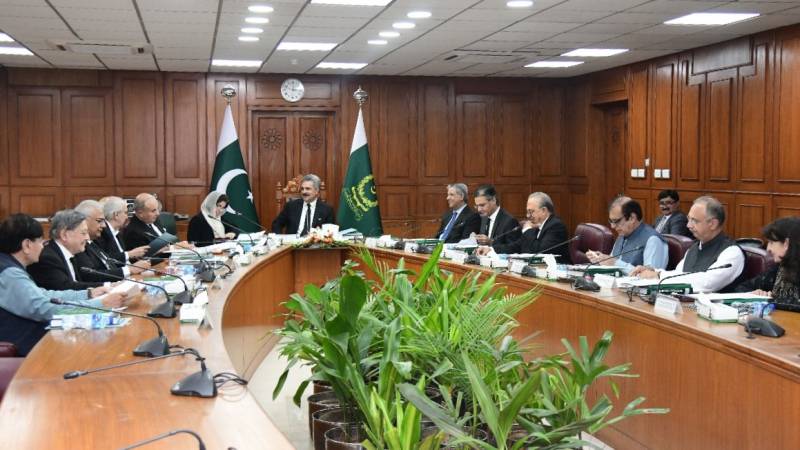
Through a majority of seven against five, the Judicial Commission of Pakistan (JCP) Tuesday appointed Justice Aminud Din Khan as the head of the constitutional bench in the Supreme Court.
The appointment was made during JCP's first meeting after the passage of the 26th constitutional amendment last week. The meeting, held in Islamabad, was chaired by Chief Justice Yahya Afridi.
The meeting was attended by 12 members including CJP Afridi, senior puisne judge Justice Mansoor Ali Shah, Justice Munib Akhtar, Justice Aminud Din Khan, Senator Farooq H. Naek, MNA Sheikh Aftab Ahmad, Pakistan Tehreek-e-Insaf's (PTI) MNA and Parliamentary Leader Omar Ayub, Roshan Khursheed Bharucha, Law Minister Azam Nazeer Tarar, PTI's Senator Shibli Faraz, Attorney General for Pakistan Mansoor Usman Awan, and Pakistan Bar Council representative Akhtar Hussain.
Apart from naming Justice Amniud Din the head of the constitutional bench, the commission also nominated six judges for the special bench proposed by the government. These judges include Justices Jamal Khan Mandokhail, Muhammad Ali Mazhar, Ayesha A. Malik, Syed Hassan Azhar Rizvi, Musarrat Hilali and Naeem Afghan. Justices Mandokhail and Afghan are from Balochistan; Justices Mazhar and Rizvi are from Sindh; Justices Amin and Malik are from Punjab while Justice Musarrat Hilali is from Khyber Pakhtunkhwa (KP).
Per the 26th constitutional amendment, a second three-judge bench fixing committee will be formed in the top court, which will exclusively form benches to hear cases assigned to the constitutional bench. This committee shall be headed by the head/presiding judge of the constitutional bench - Justice Aminud Din Khan, and comprise two senior-most judges nominated for the pool of constitutional bench judges - Justices Mazhar and Mandokhail. They will decide the members of the constitutional bench who will hear cases of constitutional interpretations and those filed under Article 184(3) or cases of advisory jurisdiction.
The constitutional bench has been formed for a period of 60 days.
As per the 26th Constitutional Amendment, the recomposed JCP comprises 13 members. It is responsible for making appointments to the Supreme Court - including nominations for the head of the constitutional bench, the high courts, and the Federal Shariat Court (FSC).
After the constitution and nominations for the constitutional bench, the next senior-most judge after Justice Aminud Din has become a member of the JCP.
Likewise, Justice Aminud Din has also become a member of the three-judge committee formed under the Supreme Court Practice and Procedure Act, which CJP Afridi heads. Consequently, Justice Munib Akhtar, who was included in the committee last week by CJP Afridi following his appointment, has been automatically replaced on the bench fixing committee.
Reconstituted commission's maiden meeting
Sources privy to the proceedings of Tuesday's JCP meeting said that Justice Shah and Justice Akhtar suggested that the five-judge constitutional bench should be headed by CJP Afridi - rather than by any other judge of the top court - and that it should comprise senior judges of the top court. Sources added that commission chairman CJP Afridi asked members of the commission to vote on this proposal by raising their hands. Subsequently, sources added, only five members, including CJP Afridi, Justices Shah and Akhtar, and members of the opposition in Parliament Omar Ayub and Shibli Faraz, raised their hands on the suggestion.
It was suggested by sources that the government believed that since CJP Afridi was the head of an institution, he had far too many responsibilities. Therefore, sources said the government proposed Justice Aminud Din head the constitutional bench. Hence, the remaining members of the JCP raised their hands in favour of the government's nominations.
Earlier, at the outset of the meeting, PTI members Ayub and Faraz suggested that the rules should be made before considering other agenda items.
According to sources, only CJP Afridi, Justices Shah and Akhtar agreed with the PTI members.
Sources added that JCP member Ayub tabled his written stance before the commission, to which Senator Shibli Faraz expressed his agreement. The sources added that Ayub had also sought to point out the quorum of the commission, but he was told that the quorum was not complete because of the vacancy of the presiding judge, adding that since there was no head of the constitutional bench present, the commission could not decide any matter.
"This objection was later put to a vote and by majority, the meeting affirmed that the proceedings are in consonance with the Constitution and can continue in the absence of one member," noted an official statement issued by the spokesperson's office.
The commission also discussed the establishment of a dedicated secretariat for it to support and perform its functions. After thorough consideration, the commission authorised its chairman, CJP Afridi, to proceed with making rules for and the establishment of the secretariat.
"The Chief Justice expressed the views of the judges regarding the constitutional bench under Article 175(A) of the Constitution and suggested certain duration of the bench," the press statement said.
"Other participants also expressed their views on the matter, which was considered and thoroughly debated."
The press statement added that the initial session of the reconstituted Judicial Commission marks a procedural step in advancing the commission's functions under the new framework provided by the 26th constitutional amendment.

